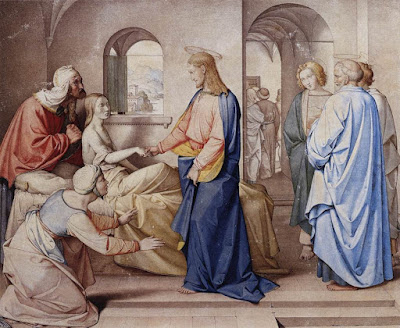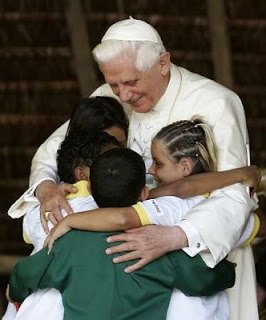‘They brought to him all who were sick.’ Sunday Reflections, 5th Sunday in Ordinary Time, Year B

Christ Raises the Daughter of Jairus
Friedrich Overbeck [Web Gallery of Art]
Readings (New American Bible: Philippines, USA)
Readings (Jerusalem Bible: Australia, England & Wales, India [optional], Ireland, New Zealand, Pakistan, Scotland, South Africa)
Gospel Mark 1:29-39 (New Revised StandardVersion, Anglicised Catholic Edition)
As soon as they left the synagogue, Jesus entered the house of Simon and Andrew, with James and John. Now Simon’s mother-in-law was in bed with a fever, and they told him about her at once. He came and took her by the hand and lifted her up. Then the fever left her, and she began to serve them.
That evening, at sunset, they brought to him all who were sick or possessed with demons. And the whole city was gathered around the door. And he cured many who were sick with various diseases, and cast out many demons; and he would not permit the demons to speak, because they knew him.
In the morning, while it was still very dark, he got up and went out to a deserted place, and there he prayed. And Simon and his companions hunted for him. When they found him, they said to him, ‘Everyone is searching for you.’ He answered, ‘Let us go on to the neighbouring towns, so that I may proclaim the message there also; for that is what I came out to do.’ And he went throughout Galilee, proclaiming the message in their synagogues and casting out demons.

Pope Benedict with children [Source]
This week I will simply copy Pope Benedict’s words on today’s gospel during his Angelus talk on this same Sunday in 2012. I will highlight what particularly strikes me.
Dear Brothers and Sisters,
This Sunday’s Gospel presents to us Jesus who heals the sick: first Simon Peter’s mother-in-law who was in bed with a fever and Jesus, taking her by the hand, healed her and helped her to her feet; then all the sick in Capernaum, tried in body, mind and spirit, and he “healed many… and cast out many demons” (Mk 1:34). The four Evangelists agree in testifying that this liberation from illness and infirmity of every kind was — together with preaching — Jesus’ main activity in his public ministry.
Illness is in fact a sign of the action of Evil in the world and in people, whereas healing shows that the Kingdom of God, God himself, is at hand. Jesus Christ came to defeat Evil at the root and instances of healing are an anticipation of his triumph, obtained with his death and Resurrection.
Jesus said one day: “those who are well have no need of a physician, but those who are sick” (Mk 2:17). On that occasion he was referring to sinners, whom he came to call and to save. It is nonetheless true that illness is a typically human condition in which we feel strongly that we are not self-sufficient but need others. In this regard we might say paradoxically that illness can be a salutary moment in which to experience the attention of others and to pay attention to others!
However illness is also always a trial that can even become long and difficult. When healing does not happen and suffering is prolonged, we can be as it were overwhelmed, isolated, and then our life is depressed and dehumanized. How should we react to this attack of Evil? With the appropriate treatment, certainly — medicine in these decades has taken giant strides and we are grateful for it — but the Word of God teaches us that there is a crucial basic attitude with which to face illness and it is that of faith in God, in his goodness. Jesus always repeats this to the people he heals: your faith has made you well (cf. Mk 5:34, 36).
Even in the face of death, faith can make possible what is humanly impossible. But faith in what? In the love of God. This is the real answer which radically defeats Evil. Just as Jesus confronted the Evil One with the power of the love that came to him from the Father, so we too can confront and live through the trial of illness, keeping our heart immersed in God’s love.

Blessed Chiara Luce Badano [Source]
(29 October 1971 – 7 October 1990)
We all know people who were able to bear terrible suffering because God gave them profound serenity. I am thinking of the recent example of Blessed Chiara Badano, cut off in the flower of her youth by a disease from which there was no escape: all those who went to visit her received light and confidence from her! Nonetheless, in sickness we all need human warmth: to comfort a sick person what counts more than words is serene and sincere closeness.
Dear friends, next Saturday, 11 February, the Memorial of Our Lady of Lourdes, is the World Day of the Sick. Let us too do as people did in Jesus’ day: let us present to him spiritually all the sick, confident that he wants to and can heal them. And let us invoke the intercession of Our Lady, especially for the situations of greater suffering and neglect. Mary, Health of the Sick, pray for us!
Next Sunday, 11 February, is this year’s World Day of the Sick.

Blessed Chiara [Source]
On a pastoral visit to Palermo, Italy, on 3 October 2010 Pope Benedict had this to say about Blessed Chiara [emphases added]: I do not want to start with a discussion but with a testimonial, a true and very timely life story. I believe you know that last Saturday, 25 September, a young Italian girl, called Chiara, Chiara Badano, was declared Blessed in Rome. I invite you to become acquainted with her. Her life was a short one but it is a wonderful message. Chiara was born in 1971 and died in 1990 from an incurable disease. Nineteen years full of life, love and faith. Her last two years were also full of pain, yet always of love and light, a light that shone around her, that came from within: from her heart filled with God! How was this possible? How could a 17 or 18-year-old girl live her suffering in this way, humanly without hope, spreading love, serenity, peace and faith? This was obviously a grace of God, but this grace was prepared and accompanied by human collaboration as well: the collaboration of Chiara herself, of course, but also of her parents and friends.
You may read more about Blessed Chiara Luce Badano in The Saint Who Failed Math by Richelle Verdeprado published in the September-October 2010 issue of MISYONonline.com, the magazine of the Columbans in the Philippines of which I used to be editor.
The whole of Pope Benedict’s address to the young people and families of Sicily is well worth reading and reflecting on in the context of this year’s World Meeting of Families in Ireland in August.
